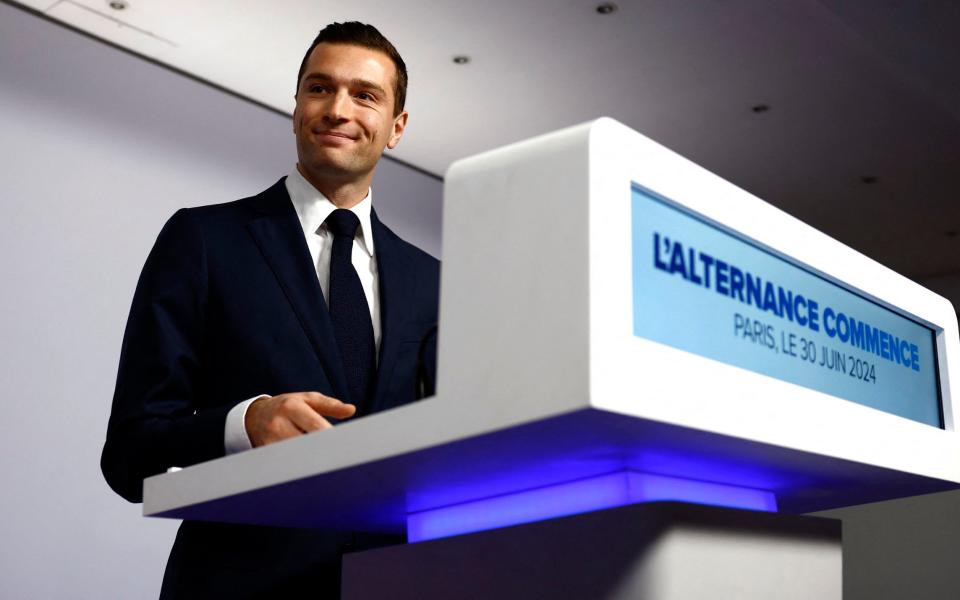What are Marine Le Pen’s plans for France?

After Marine Le Pen’s National Rally walloped Emmanuel Macron in the first round of voting in the French elections, there is a real chance France could be governed by a hard-Right party for the first time since the Second World War.
Then, France’s collaborationist Vichy regime claimed authority over the country in an armistice deal with Nazi Germany.
Ms Le Pen has spent more than a decade trying to detoxify her National Rally party and turning it from a movement that once celebrated Nazi collaboration to a genuine electoral force.
On Sunday evening, the National Rally was seen winning around 34 per cent of the vote, according to early exit polls from Ipsos, Ifop, OpinionWay and Elabe.
Although the final result will depend on days of horse-trading before next week’s run-off, it’s evident her message is resonating with voters.
She is predicted to win the largest number of seats in France’s National Assembly.
If that happens, here is a look at what to expect from a National Rally-led government.
Immigration
At the centre of Ms Le Pen’s policy platform is a promise to toughen France’s immigration policy. First, the National Rally has vowed to end birthright citizenship, under which children born to two foreign parents in France automatically obtain French citizenship at the age of 18. To be eligible they must also be living in the country at the time they turn 18 and have lived in the country for a minimum of five years since the age of 11.
“The automatic acquisition of French nationality is no longer justified in a world of eight-billion people, when daily evidence of our inability to integrate and assimilate is multiplying on our soil,” said Jordan Bardella, 28, the man vying to be National Rally’s prime minister.
National Rally would also slap restrictions on family reunifications by introducing additional conditions on employment and income.
It has separately unveiled plans to reduce access to medical services for illegal immigrants to emergencies only, and limit access to welfare benefits to French citizens only.

Security
National Rally has attempted to position itself as the party of law and order, promising to slash welfare allowances and social assistance for families of repeat juvenile offenders.
Under the plans, teenagers aged 16 and above would be tried as adults.
France’s police forces, known for their violent crackdown on protests, would be granted an automatic “presumption of self-defence” in cases that involve violence.
But one of the most contentious issues to emerge from the National Rally’s security manifesto is barring dual-nationals from holding jobs in “sensitive strategic posts” like defence. These would be reserved for the French. Political opponents were quick to slam the proposal calling it discriminatory and hypocritical.
“The message you are sending is that when we are bi-national, we are half-national, we are in fact not real French and we would not be trusted to occupy positions of responsibility,” Gabriel Attal, the prime minister said during a TV debate.
Gerald Darmanin, the interior minister, added that such a policy would “divide the nation” and discriminate against the three-million French-Americans, French-Algerians, French-Portuguese, French-Moroccans living in France. He also pointed out that candidates who apply to highly sensitive government positions already undergo thorough security screenings.
“I don’t like this way of filtering the French,” Mr Darmanin said.
Foreign policy
On the international front, National Rally has promised to cut funding to the European Union by up to €3 billion a year to fund cuts to VAT at home.
The movement has pledged to continue supporting Ukraine, but Mr Bardella has signalled France’s military assistance could be significantly watered down.
The prime ministerial candidate has said he draws a “red line” at sending missiles, military equipment or French troops to the war-torn nation, because it is escalatory in the eyes of Moscow.
Ms Le Pen has often struggled to shed her reputation as a Putin apologist, especially after a picture of her and the Russian president has been used as a beating stick by her opponents.
And with a separate war raging in the Middle East, National Rally has said it opposes recognising a Palestinian state.

Social benefits
National Rally has promised to scrap Emmanuel Macron’s pension reforms that controversially raised the retirement age.
It would reinstate the traditional retirement age of 62.
For those who started working before the age of 20 and worked for 40 years, they would be allowed to retire at 60.
Mr Macron’s unemployment benefit changes would also be repealed. The current policy cuts access to unemployment benefits and shortens the length of benefit entitlement from 18 to 15 months.
But social benefits would also be restricted to French nationals, or those who have worked in France for at least five years.

 Yahoo News
Yahoo News 
